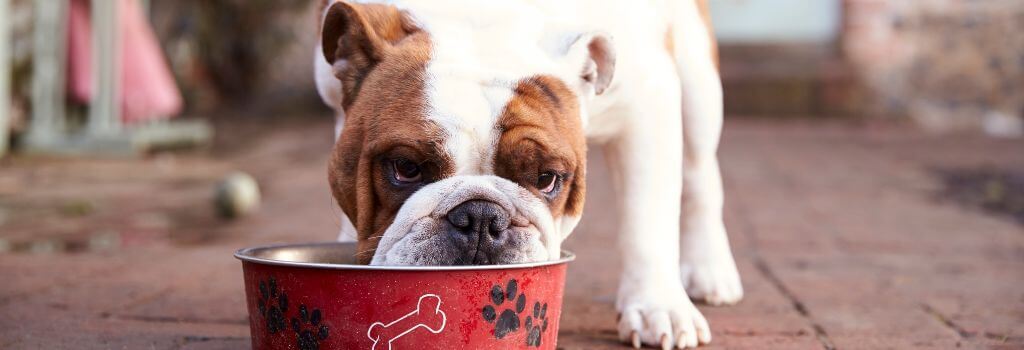Dogs are cute, no argument there! Snuggles on the couch, zoomies in the yard, and those big, begging puppy eyes? It’s easy to see why dogs are one of the most popular pets in the U.S. But let’s be honest, not everything they do is quite so lovable, and farting is definitely one of those less charming habits.
While dog gas is completely natural and farting is something that all dogs do as a normal part of digestion, it's something that can take a lot of owners by surprise and make them question if their dog is sick or got into something they weren't supposed to. So, if you have a gassy dog, keep reading because in this blog, I'll be breaking down why dogs fart, what's normal, and when you should be concerned and get in touch with your veterinarian.
Dog Gas: What It Is & Why It Happens
Before we dive in and talk about why your dog could be gassy, let's go over a few basics regarding gas in dogs. The first thing pet owners should understand is the terminology used to describe what their dog is experiencing when they are "gassy."
Medically speaking, flatulence occurs when there is a formation of excess gas in a dog's stomach or intestines. When the gas becomes excessive and needs to be released, flatus occurs through burping or farting. In addition to those common gas release symptoms that owners are likely familiar with, flatulence can also cause an audible grumbling gastrointestinal (GI) system, which is clinically known as borborygmus.
Next, it's important for owners to know that their dog farting or passing regularly is completely normal and isn't an immediate indicator that something is wrong with their digestive system. In fact, healthy dogs with normal GI function may pass gas a few times a day, on average. Normal gas typically doesn't have a significant odor and doesn't cause the dog any discomfort. Mild cases of gas are bound to happen every now and again as well, especially if your dog ate too quickly or ate something that didn't quite agree with them.

Why Is My Dog So Gassy?
Now that we've established what canine flatulence is, let's tackle the bigger question that you came here for: Why is my dog farting so much?
Beyond normal dog gas, there are a number of reasons that a dog may be farting – and even burping – more than usual, including:
- Swallowing air: Introducing excess air to a dog's digestive tract happens when dogs eat or drink too quickly or pant heavily. This excess air needs to be released somehow, and farting or burping is a dog's natural way of releasing it.
- Dietary causes: Certain foods, especially those high in fiber, fat, or unfamiliar ingredients, can cause gas. Table scraps, dairy, or spicy foods are common culprits and can cause gas in many dogs.
- Food intolerance or allergy: Some dogs are sensitive to specific proteins, grains, or additives in their food.
- Digestive imbalance: A disruption in the gut microbiome or mild gastrointestinal upset can lead to more gas production.
- Underlying health issues: Conditions like inflammatory bowel disease, intestinal parasites, or pancreatic insufficiency may cause chronic flatulence.
8 Breeds More Prone to Dog Gas
Will some dogs have gas more often than others? Absolutely! While every dog will experience gas, there are a few breeds that are more likely to do so often enough for their owner to notice.
Some dogs can be more prone to passing gas due to their eating habits, anatomy, allergies or food intolerances, and predisposition to digestive upset. Due to their unique body structures and personality traits, certain breeds of dogs have been identified to have a higher likelihood of gassiness throughout their lifetime.
These commonly gassy dog breeds include:
- Bulldogs (English and French): Their short, flat noses (brachycephalic anatomy) cause them to swallow a lot of air when eating or breathing. Combined with sensitive stomachs, this often leads to excessive flatulence.
- Boxers: Like Bulldogs, Boxers are brachycephalic and tend to gulp air while eating due to their facial structure. These dogs also have a tendency toward food sensitivities and gastrointestinal issues, making them often gassier than the average dog.
- Pugs: Their compact airways and tendency to overeat or eat too quickly contribute to frequent air swallowing and gas buildup – a perfect combination for gassiness.
- Labrador Retrievers: Labs are notorious foodies, and many owners know all too well that they will eat anything in sight, including human food and garbage. Their indiscriminate eating habits and the speed at which they eat can upset digestion and cause gas.
- German Shepherds: This breed is more prone to digestive disorders like exocrine pancreatic insufficiency (EPI) and food sensitivities, which can both lead to excess gas.
- Beagles: Known for their strong appetite and tendency to scavenge, Beagles often eat things they shouldn't, which can cause temporary or chronic digestive upset.
- Boston Terriers: Another brachycephalic breed, Boston Terriers also tend to swallow air easily and may have trouble digesting some foods, like dairy products, high-fat foods, and grains, among other things.
- Dachshunds: While their short stature may be cute, their long, low bodies may be more prone to digestive tract pressure and bloating, especially if they are overweight or eat too quickly.

Why Do Dog Farts Smell So Bad?
One of the most common ways owners realize their dog has gas is through an off-putting smell. While some dog farts can be odorless and almost undetectable, others can be foul-smelling and very noticeable to everyone in the room.
How much odor a dog's farts have can be influenced by a number of factors, including their diet, gut health, and eating habits. But one of the main reasons dog farts smell bad is the presence of hydrogen sulfide and other sulfur-based gases in them, which are byproducts of bacterial fermentation in the intestines. These gases are produced when gut bacteria break down certain proteins, especially those rich in sulfur, like red meat, eggs, and legumes.
While a few smelly dog farts here and there aren't usually a cause for concern, it shouldn't be happening all of the time. So, if your dog is regularly passing gas that can clear a room in an instant, there's a good chance that more than just regular digestion is the cause. Chronic foul-smelling gas can sometimes be linked to conditions such as Inflammatory bowel disease (IBD), pancreatic insufficiency, intestinal parasites, and malabsorption disorders, so if your dog seems to be extra gassy – and extra stinky – a trip to the vet is probably in order.
What to Do When Your Dog Has Bad Gas Suddenly
If your dog is suddenly experiencing a bad bout of gas, it's only natural to want to get them some relief as soon as possible. One of the most commonly recommended remedies for gas in dogs isn't a pill but rather a change in diet or eating habits. To start, think about any recent changes in your dog's diet or eating patterns: Did you introduce a new food, offer table scraps, or let your dog into the trash? These are all common triggers for gas, and addressing them could be a simple and straightforward way to relieve the symptoms of dog gas.
Now that we've covered what to do to help eliminate bad episodes of dog gas at the source, you're probably wondering, "What can I give my dog for gas relief in the short term?" While there are some medications that can be used for dog gas relief, it's important to use them only if they are approved by your veterinarian. Every dog is different, and the safest and most effective way to give them some relief from gas is to closely follow your veterinarian's recommendations.
If My Dog Keeps Farting, Do I Need to Take Them to the Vet?
We get it; calling in to tell your veterinarian that you're worried about your dog farting isn't a phone call that every owner wants to make, but sometimes it's necessary. If your dog's gas is excessive, foul-smelling, or accompanied by diarrhea, vomiting, or bloating, it's time to consult your vet and get to the real root of your dog's digestive upset. Chronic gas could indicate food allergies, infections, or more serious digestive issues, so it's always better to play it safe and bring your dog in for a check-up if the gas is persistent or accompanied by other worrisome symptoms.
To prevent episodes of dog gas at home, try to:
- Feed your dog a high-quality, easily digestible diet
- Avoid table scraps and greasy human food, especially if your dog has a sensitive stomach
- Introduce new foods gradually and monitor for any digestive changes
- Use a slow-feeder bowl to keep your dog from swallowing excess air
- Limit high-fiber and gas-producing ingredients
- Keep your dog from eating too fast or scavenging
- Talk to your vet about adding probiotics or digestive enzymes to your dog's diet
- Encourage an active lifestyle and exercise your dog regularly
With a little extra attention to your dog’s diet and some collaboration with your veterinarian, you can get your dog’s digestive system in check and make frequent, stinky farts a thing of the past. Your dog – and any house guests – will thank you!
If you have questions and you'd like to reach out to us, you can call us directly at (319) 234-7511 , or you can email us at ppcvets@gmail.com. Don't forget to follow us on social media Facebook, Instagram.

